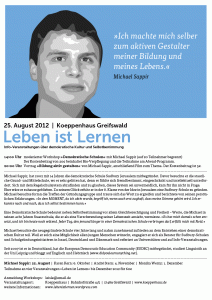
What are the main ingredients of a democratic culture?
On August 25th, I’ll be giving a workshop and lecture in Greifswald. At the EUDEC conference in Freiburg, my host and I grabbed two plastic chairs and sat down in a sunny spot for a short interview, some of which is now on the fine poster ad you see here; at one point he asked me a question I haven’t heard too often: what are the main characteristics of individuals who are part of a “democratic culture”?
A democratic culture, as I understand it, is a kind of culture that develops within a group that makes decisions democratically; democratic culture makes democracy more than just a decision-making process – instead it becomes a way of life, something you notice in all kinds of interactions between people.
I came up with four main points:
- Communication at eye level (as opposed to talking up or down to someone) – regardless of age
- Respect for all other individuals
- Willingness to listen, even when confronted with a view you disagree with
- Willingness to reflect on one’s actions, recognize mistakes, and learn from them
To me, these are the things that people have to have in order to keep a truly democratic culture alive.
Without equal communication, respect, and willingness to listen, the discussions that are the bread and butter of democracy are impossible. Without a willingness to reflect, they’re pointless.
What do you think are the most important ingredients of democratic culture? Leave a short comment below!
